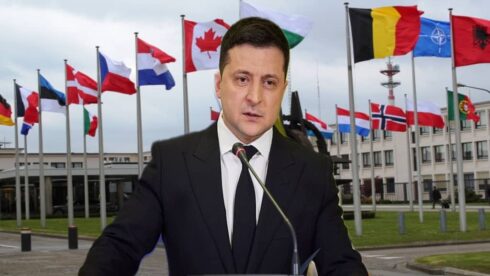Ukrainian President Volodymyr Zelensky has expressed his readiness to resign from his position if it would lead to peace or secure NATO membership for Ukraine. This announcement comes amid escalating tensions and ongoing negotiations involving global powers. During a press conference in Kyiv on February 23, 2025, President Zelensky stated his openness to step down to achieve peace for Ukraine. He remarked, “If it brings peace for Ukraine, if you really need me to leave my post, I’m ready.” This statement underscores his commitment to ending the prolonged conflict that has severely impacted the nation.
Zelensky further emphasized that his primary focus is on Ukraine’s immediate security rather than prolonging his tenure. He noted, “I am focusing on security today and not in 20 years’ time… I won’t be in power for decades.” This highlights his dedication to prioritizing the country’s stability over personal political ambitions.
Linking Resignation to NATO Membership
The Ukrainian President also suggested that his resignation could be exchanged for Ukraine’s accession to NATO. He stated, “I can exchange it for NATO [membership]. If such conditions exist, I will step down immediately.” This proposal indicates his strategic approach to securing long-term security guarantees for Ukraine through integration into Western defense structures.
NATO membership has been a contentious issue, with Russia viewing Ukraine’s potential accession as a direct threat. Despite these challenges, Zelensky maintains that joining NATO remains the most viable security guarantee against future aggression.
U.S. Relations and Mineral Rights Negotiations
Relations between Ukraine and the United States have experienced strain, particularly concerning negotiations over Ukraine’s mineral resources. The Trump administration has proposed a deal wherein the U.S. would gain significant access to Ukraine’s mineral wealth, including critical resources like lithium and titanium, as compensation for military aid provided during the conflict.
President Zelensky has expressed reservations about the proposed terms, emphasizing the need for fair agreements that do not impose unsustainable financial burdens on Ukraine. He stated, “I’m not going to sign something that ten generations of Ukrainians will be paying for.” This stance reflects his commitment to protecting Ukraine’s economic sovereignty while acknowledging the importance of international partnerships.
Escalation of Russian Drone Attacks
Coinciding with these political developments, Ukraine has faced intensified military aggression from Russia. On the eve of the third anniversary of the full-scale invasion, Russia launched its largest drone assault to date, targeting multiple regions across Ukraine. Ukrainian air defenses reported intercepting a significant number of these drones, yet the attacks resulted in considerable damage and civilian casualties.
President Zelensky condemned the attacks, describing them as “aerial terror” and highlighting the urgent need for robust air defense systems. He called upon international allies to strengthen support, stating that achieving a “lasting and just peace” requires the collective strength of Europe and America.
International Diplomatic Efforts and Exclusion from Peace Talks
The geopolitical landscape is further complicated by ongoing peace negotiations between the United States and Russia, from which Ukraine has been notably excluded. This exclusion has raised concerns in Kyiv and among European allies about the potential outcomes of such talks and the implications for Ukraine’s sovereignty and territorial integrity.
In response, President Zelensky has emphasized the necessity of Ukraine’s involvement in any peace agreements affecting its future. He asserted, “They can discuss whatever they want in their relations… but it is not possible to decide anything about Ukraine without us.” This stance reinforces Ukraine’s insistence on being a central participant in negotiations that directly impact its national interests.
European Solidarity and Upcoming Summits
In a show of support, European leaders are scheduled to convene in Kyiv to discuss security guarantees and further assistance for Ukraine. The summit aims to solidify commitments to Ukraine’s sovereignty and explore avenues for enhanced cooperation. President Zelensky expressed optimism about the meeting, suggesting it could represent a “turning point” in securing lasting peace and stability for the region.
The outcomes of these diplomatic engagements are poised to significantly influence the trajectory of the conflict and Ukraine’s future on the international stage. The global community continues to monitor the situation closely, recognizing the broader implications for regional and global security.














